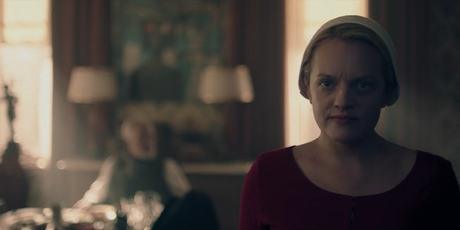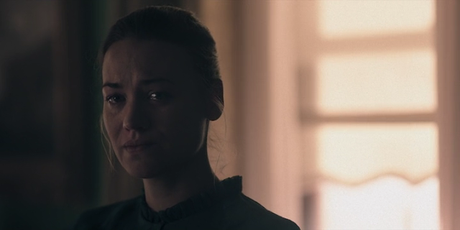
Usefulness, and valuing people based on their utility for a specific purpose, is one of the reasons for why Gilead is the way it is. It is the opposite of intimacy – and exactly the scale that Commander Lawrence uses to decide who is worthy of a good life and who isn’t. Lawrence is an economist, but he is so dangerous because he utilises economic thinking to achieve an ideological goal, one that he would deny he even has, because he mistakes his ideology for rationalism and the objective truth, as so many smart but unchecked people do. June leans this lesson in this episode, that the man that she can’t read, the man that is an evasive mystery even to those closest to him, cannot be trusted because he never argues in good faith, and he never considers that other people may have just as much of an interior life as he does. It’s a hard lesson to learn exactly because he seems so promising to start off with – a man openly defying the cultural censorship of Gilead, a man who allows Mayday to operate from his basement, the man who helped Emily and Nicole escape. But he cannot be trusted, because he measures human value in numbers.
June starts the episode off by trying to learn as much about this man as she can, putting an amount of hope into her relationship with him, only to learn later that this is a hopeless endeavour. For one, Commander Lawrence seems to despise her, not just for her decision to not be rescued, but also for all the reasons why Gilead made her into a Handmaid in the first place. He throws those things in her face that we watched happen – that she left her sick child at childcare to go to her job, that she stole Luke from his wife. It’s the first sign we get that this man is just as much of an ideologue as Commander Waterford is, and that he sees the same connection between the freedom of women to choose with the decline of the birth rate. In his mind, all this horrible violence is justified because he is repopulating the world – and it never occurs to him that this version of humanity is more horrible than the end of humankind altogether, and that he is creating a world exclusively for men.
Commander Lawrence is selective in his thinking, and his isn’t aware of his blind spots. The only valuable piece of information that June learns about him in this episode, apart from the fact that he cannot be trusted and that he isn’t the ally who will help her save Hannah, is what Commander Waterford tells her (after June once again plays him the way she used to) – that Lawrence doesn’t like to be bored. There is a moment in which June thinks that Lawrence is taking her into his confidence, when he navigates for her to overhear a meeting of the Commanders, but only moments later she realises that she is meant to be some kind of party trick, or proof of concept. Lawrence speaks about the usefulness of women and approaches June the same way that Serena did, giving her a second of hope when he alludes to her former career as an editor. Perhaps they are intellectual equals, who can speak on the topic of biological differences between men and women, much discussed in literature. But then he goes in the exact opposite direction (especially compared to how Serena used June’s abilities when she needed them), and has June fetch him a book, mocking her in the process in front of all these men, describing the book so that she doesn’t have to read the title. He has turned a book editor into someone who isn’t even allowed to read three words.
This, as it turns out later, is part of his job, and it seems important to him for June to know. He is going through “resumés” (the word itself a mockery) to find new candidates for Marthas to replace the ones that have been hanged at the wall, to detract others to join Mayday. He is deciding if an accountant would make a good cook. In his hands, these women and their careers are twisted and turned, made useful in a world that denies that women have the capacity to be anything more than what men shape them to be.
In Lawrence’s mind, these are the kind of decisions that are saving the world, and they are the burden that he must bear. He cannot trust June, as she left her previous posting in literal ashes, and he doesn’t take her as seriously as he did Emily (who, he says, he saved because she was “unimaginably smart and could be useful to the world one day”, presumably a usefulness that would be lost in Gilead). He does, and perhaps rightfully, point out that June’s talent for friendship and intimacy is transactional, that she is looking for an angle, but then fails to consider that he has created a world in which that is the only rational approach a woman like June could take to gain any sense of self and power over her life back. Lawrence has created Gilead, and Gilead has made June transactional, and now he is holding that against her, not just on a purely selfish level where he cannot trust her, but also on a more general one where he blames her for not being more useful to the world that he is trying to create.
June: You wrote esoteric books. You did that. God, it must be scary, seeing the numbers on those spreadsheets turning in real people, real people being executed. Knowing that if no one had read your books we would all be better off. It must be hell being a man like that, far worse than being useless. Lawrence: How tempting it is to invent a humanity for anyone at all.
In the novel, Lawrence’s line is used by the Handmaid, to explain something that she once read about a woman who loved a Nazi, and tries to invent his humanity, to pretend that he wasn’t a monster. It’s an interesting moment, in which Lawrence maybe intentionally reminds her that she shouldn’t humanise her captor, except he then goes on to show her the horrible cages filled with women over whose fate he has to decide, gloating that none of them will be executed, that they will be sent to the colonies (which, June knows, is maybe worse than execution), save for five, whom he gets to choose. He is perhaps trying to present the burden that he must bear, deciding only on a few facts who would make a good Martha, and then he asks June to do it, and she refuses his attempt to make her complicit in Gilead’s hatred of women.

Later, what she learns here will intersect with what Serena is learning by the sea, in her mother’s house, where is to be reintegrated into higher Gileadean society, where a prayer circle and some good talking tos are meant to make her reconsider her marriage, the value of it, and more than that, the fact that her only value comes from her marriage, and Fred. It’s the first time we get a real sense of how Serena came into existence in the first place, how she turned into one of the first ideologues of Gilead. There is a reason why her mother seems to be right at home, and has no interest in seeing what it meant to Serena to lose the intimacy and trust of her marriage to a man who is now practicing his begging for forgiveness on a mistress. Serena’s mother is trying to bring her daughter’s mind back into alignment with Gilead’s ideology, but instead, the beautiful sea baptises her into something else – an awareness, a change, a new sense of self-possession that may have been impossible before. This is how she meets June, later, after Commander Lawrence has proven himself to be a danger, not an ally, and after Nick has proven himself as useless as ever, except for one purpose.
Serena: She isn’t mine.And this – still transactional, but working so well because June knows that they are connected to their love for Nicole, even where Serena’s claim on her is wrong (and how hard is that moment when her own mother throws that in her face). In Gilead, we’ll never know what the emotional truth in that relationship is, because their inherent power dynamics won’t allow it, but what an interesting question to ask, in any case. June has found the men useless for her purpose, which has gone beyond saving Hannah, especially because the only way to save her is to bring down everything that created the mirage in the first place.
June: Serena. Only a mother could do what you did. If you can just think about all the other mothers who have had their children taken away from them.
Serena: Like you.
June: There has to be something we can do.
Serena: That isn’t why I came here.
June: We can help each other. We cannot count on them. They hate us, Serena. They are not on our side.
Serena: I tried.
June: You have to try harder.
Serena: I’m not that person anymore.
June: Are you scared? Of losing? Maybe we are stronger than we think we are.
June: And here’s what we do. We watch them, the men. We study them. We feed them. We please them. We can make them feel strong, or weak. We know them that well. We know their worst nightmares. And with a bit of practice, that’s what we become. Nightmares. One day, when we’re ready, we’re coming for you. Just wait.
Random notes:
Lawrence says he has “binders full of women” (and he literally does), and how odd to see this reference to a small scandal in the 2012 election feel so much like ancient history now, in 2019. How comparatively harmless does that line sound when contrasted with the worst of Trump’s utterings.
There are a few really good moments here, like how Serena successfully burned all of the green dresses that symbolise who she is only for her mother to make her another one, and like how Rita gives her the dressing for her missing finger, which serves as much to cover up what happened as it does to make her feel better, and so Serena knows she must discard it once she is ready to face the truth, and June.

